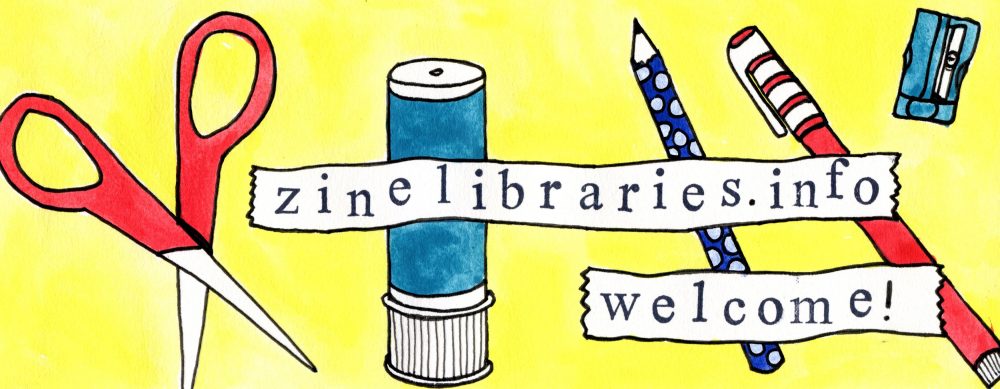There’s been a request for a little extra info about the primary communication pages for zine librarians. I’ve added the ones I know about and since I registered for two of them today, I’ll annotate the processes required by each briefly.
> *We Make Zines (ning site) – wemakezines.ning.com
This one is probably the most complicated to get settled into. One trick is just to think of it like a zine-specific, simplified version of facebook or myspace.
On the home page, you’ll see multiple “signup” buttons on the right side of the screen. Click any. Fill in your registration data and create your user name and password. The process is pretty straighforward. Once you’ve registered, you’ll be redirected to a welcome page on the authenticated side of the site. If you look in the upper right corner again, you’ll see a few new options available to members:
Inbox: needs no explanation
Alerts: Alerts are messages sent to you by applications you or your friends have added.
Friends: functions just the way any social networking site does (facebook, myspace.)
Settings: Through this option you can do things like set up your profile, add pictures, and change your privacy settings.
Setting up a profile is quickly accomplished, if not exactly intuitive. Once you click “settings” you’ll be directed to a page with fields asking for your profile information, gender, age, location, etc. Fill in as much or as little as you like (and, as mentioned before, if you want nothing to be visible, edit your profile in the privacy settings page.)
The final step is adding information about your professional activities (your zine doings) in your profile. Goto the page wemakezines.ning.com/profile/yourprofilename. From this page you can add your information either in the text box provided, or blog style. Please, as a zine librarian or ZL sympathizer, give us all a clear idea of where you work, what your collection’s mission is, your areas of interest in the big scheme of zine librarianship worldwide (web development? cataloging? programming? preservation? etc.) Aside from aesthetic improvements to your profile, you’re done!
*zinelibrarians yahoo group
This is primarily used for email correspondence. To subscribe, send an email to zinelibrarians-subscribe@yahoogroups.com
> *zine unconference wiki site
This site was the planning hub for ZL(u)C 2009 at the Hugo House and Zapp in Seattle. Now it is the temporary home for the outcomes of the conference workshops and discussions and hub for workgroups to organize their thoughts and strategies. It functions as a typical wiki and anyone can edit any page (though please try not to delete anything if possible)
> *zinelibraries.info site
You are here. It has been suggested that this site become the primary reference point for all zine librarian related needs including policy and procedure manuals, programming help, cataloging discussions, and other meta-knowledge type, ongoing discussions. No need to register with the site in order to read or comment on posts. If you would like to be able to contribute to the knowledge pool, though, you will have to register and be approved by one of the site moderators.
*Zinewiki.com
There was a lot of talk about zinewiki at ZL(u)C 2009. The discussion seemed to be heading in the direction of making zinewiki.com some sort of reference encyclopedia for zines and possibly the authority file. Jerianne, one of the site moderators, expressed a little concern about not wanting it to get too cluttered with tangential entries and information. For now, it’s a text catalog 2,500 strong and constantly being updated. No need to register at all.

